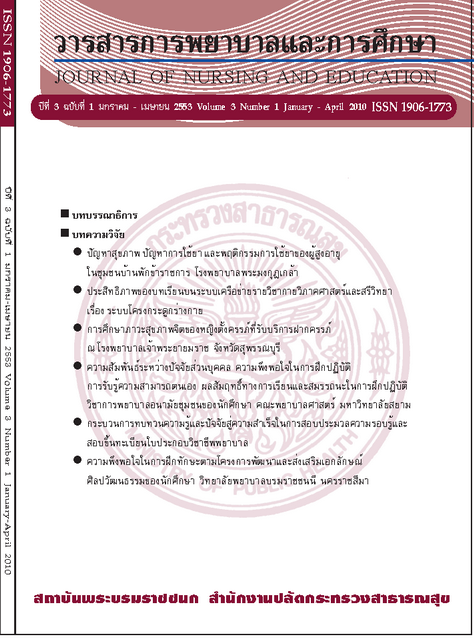ปัญหาสุขภาพ ปัญหาการใช้ยา และพฤติกรรมการใช้ยาของผู้สูงอายุ ในชุมชนบ้านพักข้าราชการโรงพยาบาลพระมงกุฎเกล้า
คำสำคัญ:
health problems, medicine-used problems, medicine-used behaviors, elderly, soldier communityบทคัดย่อ
บทคัดย่อ
การวิจัยเชิงสำรวจในครั้งนี้มีวัตถุประสงค์เพื่อ 1) สำรวจปัญหาสุขภาพ ปัญหาการใช้ยา และพฤติกรรมการใช้ยา 2) เปรียบเทียบพฤติกรรมการใช้ยาของผู้สูงอายุที่มีอายุและเพศแตกต่างกัน และ 3) ศึกษาความคิดเห็นในการส่งเสริมสุขภาพของผู้สูงอายุในชุมชนบ้านพักข้าราชการ โรงพยาบาลพระมงกุฎเกล้า สำรวจข้อมูลครัวเรือนที่มีผู้สูงอายุ จำนวน 52 ครัวเรือน เลือกผู้สูงอายุ แบบเจาะจงตามเกณฑ์ได้ผู้สูงอายุ 34 คน ทำการสอบถามปัญหาสุขภาพ ปัญหาและพฤติกรรมการ ใช้ยา โดยใช้แบบสอบถามมาตราส่วนประมาณค่า 3 ระดับ มีค่าความเที่ยง .77 และสอบถาม ความคิดเห็นในการสร้างเสริมสุขภาพของผู้สูงอายุ วิเคราะห์ข้อมูลโดยใช้สถิติบรรยายและสถิติ Mann-Whitney U test.
ผลการวิจัย พบว่า ผู้สูงอายุในชุมชนส่วนใหญ่เป็นเพศหญิงมากกว่าเพศชาย มีสถานภาพ สมรสคู่ จบการศึกษาระดับประถมศึกษา ไม่ได้ประกอบอาชีพ ไม่มีรายได้ และมีบุตรเป็น
ผู้ดูแลร้อยละ 80.3 มีโรคประจำตัวโดยเป็นโรคความดันโลหิตสูงมากที่สุด ส่วนใหญ่เป็นมากกว่า 1 โรค และมีการใช้ยาเป็นประจำ ผู้สูงอายุร้อยละ14.7 ระบุว่าตนเองมีปัญหาการใช้ยาโดยลืม รับประทานยาตามเวลาและขาดความรู้ในการใช้ยา คะแนนพฤติกรรมการใช้ยาโดยรวมมีความ เหมาะสมอยู่ในระดับมาก (M= 2.65, SD= 0.15) ยาที่ใช้มากที่สุด คือ ยาแก้ปวด ลดไข้ และยา เฉพาะโรค ผู้สูงอายุที่มีเพศและอายุแตกต่างกันมีพฤติกรรมการใช้ยาไม่แตกต่างกัน สำหรับ ความคิดเห็นต่อการส่งเสริมสุขภาพ พบว่า ผู้สูงอายุส่วนหนึ่งต้องการให้มีการจัดตั้งชมรม
ผู้สูงอายุ และมีกิจกรรมต่างๆ แต่ส่วนใหญ่รู้สึกเบื่อหน่ายในการให้ข้อมูลและยังไม่มั่นใจ ว่าจะ มีการจัดตั้งชมรมนี้ จึงไม่แน่ใจว่าจะเข้าร่วมกิจกรรมของชมรมหรือไม่ ข้อเสนอแนะจากการวิจัย คือ ผู้สูงอายุส่วนใหญ่มีโรคประจำตัวที่ต้องใช้ยาและได้รับการรักษาอย่างต่อเนื่อง ดังนั้นจึงควร มีการส่งเสริมและให้ความรู้ด้านการดูแลสุขภาพ ข้อปฏิบัติในการใช้ยา และการป้องกันภาวะ แทรกซ้อน การดำเนินงานดังกล่าวจำเป็นต้องอาศัยความมีส่วนร่วม ของชุมชนอย่างแท้จริง
Abstract
The purposes of this survey study were to explore health problems, medicine-used problems, and medicine-used behaviors among elderly in the community of Phramongkutklao hospital personnel’s residence, to compare medicine-used behaviors of elders with different ages and genders, and to study their opinions of promoting their health. The total households were surveyed to indicate the number of elderly. Then, 34 elderly were purposively selected from fifty elderly households to be asked about their health problems, medicine-used problems, and medicine-used behaviors using a 3-interval scale questionnaire with its reliability of .77. They were asked about their opinion of promoting their health. The data were analyzed by using descriptive statistics and Mann-Whitney U test.
The results were that most elderly in the community were females more than males. Most of them were married, graduated from primary schools, did not work, had no income, and had their children to look after them. 80.3 % of them had diseases. Most had hypertension and had more than one disease. They took medicines regularly. 14.7% indicated that they had problems of using medicines, such as medicines taking forgotten and lack of the knowledge of using medicines. Their overall mean score of medicine-used behaviors was highly appropriated (M= 2.65, SD = 0.15). The most frequently used medicines were analgesic, antipyretic, and medicine for particular diseases. Elderly with different ages and genders had no different medicine-used behaviors. For their opinions of health promotion, some elderly wanted an elderly club to be set up in the community for elders’ various activities organization. However, most of them felt bored of giving their information and did not believe if there would be an elderly club. Therefore, they were not assured if they would join the club. For research implication, since most elderly had diseases; they needed medication, and care continuously. Therefore, we should support and provide them with information of health care, medicine-used, and complication prevention. In doing so, we needed community participation truly.






